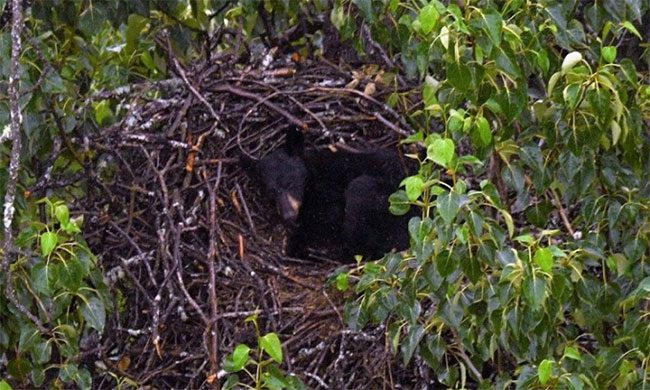Black bears sometimes invade bald eagle nests, driving away or preying on young birds that are too small to fly, threatening this raptor population.
A black bear was caught napping in an unexpected place: a bald eagle’s nest. Researchers encountered the bear sound asleep while surveying the eagle’s nest at a military base in Alaska. Black bears (Ursus americanus) occasionally take advantage of the nests built by eagles. This invasive behavior is threatening bald eagles and their young, according to the U.S. Fish and Wildlife Service (FWS), as reported by Live Science on July 26.

A black bear sound asleep in an eagle’s nest. (Photo: FWS).
“In the past, only a few eagle nests were raided by black bears with negative outcomes for the nest’s occupants,” FWS shared on Facebook. Such incidents often lead to the disappearance of the young birds.
Bears typically consume eggs and nestlings, according to Steve B. Lewis, a wildlife biologist with the FWS who is overseeing the nest survey at Joint Base Elmendorf-Richardson (JBER) in southern Alaska. “It’s difficult to determine how many bears are invading eagle nests because we cannot spend much time observing what happens or have cameras recording,” Lewis said.
During a helicopter survey in May, researchers discovered a female bald eagle (Haliaeetus leucocephalus) incubating eggs in a nest that was later invaded by the sleeping bear. A week later, the eggs were abandoned while both the female eagle and her mate were busy nearby. Lewis and his colleagues are unsure whether the incubation attempt failed or the female eagle simply paused. Male eagles often take over incubating the eggs, especially in cold locations like Alaska. For this reason, Lewis suspects the nest may have failed in the spring, long before the bear climbed in.
Bald eagles are the largest resident raptor in Alaska, with a wingspan of about 7.5 feet. This raptor species builds the largest nests in North America, with some nests measuring 8 feet across and weighing over 2,000 pounds. The massive nest can provide a safe resting place for black bears. A bear might inadvertently climb a tree and decide to take a nap.
The smell of fish emanating from the nest may also attract the bear. Eagle nests often have strong odors due to fish that adult birds catch for their young, which are sometimes left uneaten. According to Lewis, “that food is often not completely consumed, trampled in the nest, and decays. Bears have an extremely keen sense of smell, so the bear may have been drawn to the smelly nest.”
Bald eagles were listed as an endangered species in the U.S. in 1978 after their populations dramatically declined due to habitat destruction, illegal hunting, pesticides, and toxic traps, according to the Alaska Department of Fish and Game (ADFG). Thanks to conservation efforts and monitoring, their populations are recovering.


















































